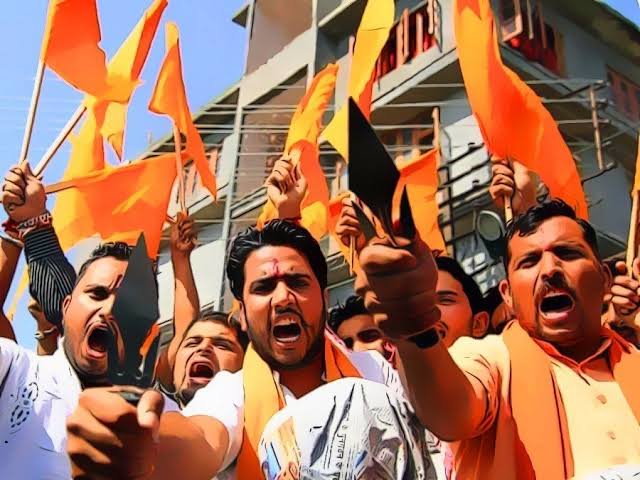Recently, it has come to light that under Prime Minister Modi’s Bharatiya Janata Party (BJP) government Muslims living in modern India who make up about 15% of the population, are struggling with discrimination, social marginalization, and targeted violence. Muslims in India are regularly subjected to discriminatory treatment by law enforcement agencies, inadequate job opportunities and limited educational prospects, among others. Major incidents which have caused international uproar include mob lynchings, attacks on mosques, various types of intergroup violence, and targeted violence against the Muslim population.
It is not unexpected that numerous Hindu hardliners, Hindutva followers and organizations have agitated for a Hindu India, neglecting other communities. Even before 1947 divisions of the subcontinent, Hindu nationalists used violent measures to achieve their goals. These rightist groups included the Sangh Parivar, which also covered various organizations under its umbrella and consisted of the RSS as its paramilitary and the BJP as its political arm. There are numerous instances of Muslim people in India being subjected to human rights abuses, with the worst cases occurring in Assam, Delhi, Jammu and Kashmir, and Uttar Pradesh. These abuses include deliberate deprivation of basic necessities and violations of one’s right to freedom of religion or belief, association, and assembly. Islamophobia in India is a rising problem for a variety of reasons, however, many believe it is an outcome of British government’s “divide and rule” policy which led to a rise in Hindu-Muslim hostilities throughout the colonial era.
Extremists of the Hindutva movement believe that India, a secular nation of 1.4 billion people composed primarily of Hindus (80%), with a small minority of Muslims (14%), should be transformed into a Hindu nation-state, with minorities being forced to comply or be exterminated. According to their ideology, Muslims are an inferior race that poses a threat to Hindus, whereas Hindus are more than simply a religious organization; they are a separate and pure ethnic race. Hindu nationalism, which is driven by India’s upper castes, seeks to uphold the rigid Hindu caste structure. Rashtriya Swayamsevak Sangh (RSS), an all-male, volunteer paramilitary organization, is part of the Hindutva movement. The RSS was formerly designed to bear resemblance to Nazism and was declared illegal in India on three occasions: in 1948 after Mahatma Gandhi was killed by one of its followers; in 1975; and in 1992 when a 400-year-old mosque was demolished. Its mission statement critiques the “endless appeasement of Muslims” and secularism in India. It is a group whose main objective, in the eyes of many, is to make India a country in which Muslims are either regarded as second-class citizens or expelled altogather.
The RSS, which has a population of five million people now, has influenced India’s national politics and curriculum. The current right-wing nationalist Prime Minister Narendra Modi joined the RSS youth movement when he was only eight years old and was officially admitted to the group in the late 1960s. He progressed in the RSS, finally rising to the position of head organizer in Gujarat, a state in India with 62 million population. The RSS appointed Modi to the BJP in 1987. The BJP came to power in India in 2014 and has its origins in the RSS’s political branch, the Bharatiya Jana Sangh. He served as Gujarat’s chief minister in 2002, the year that saw India’s bloodiest anti-Muslim riots. More than 1,000 persons were reportedly murdered with the assistance of the RSS, and most of them Muslims. Modi was thus banned from traveling abroad, including to the US and the UK.
Furthermore, it is generally known that violence and fanaticism have remained at the core of Indian politics, incidents of mistreatment and bias against minorities have scarcely ever been discouraged. Such incidents, however, although frequent, mostly avoided public attention until recently since they weren’t officially acknowledged by the government. Right-wing radicals in India have been blamed for a sharp increase in violence and discrimination, including beatings and lynchings of Muslims and new citizenship rules that curtail their rights, since Modi’s victory in 2014. In some occasions, local residents and associated paramilitary groups have incited violence against Muslim populations, particularly in key areas. Muslims in India are prohibited from visiting mosques since they frequently face mob violence and massacres when attending prayers there. They are also prohibited from eating beef, owing to Hindu religious bias regarding the sanctity of the animal. Most recently, one of the few Muslim places of worship in Gurugram, a predominately Hindu area of New Delhi, came under attack on the evening of July 31. Deputy Imam was allegedly killed by a Hindu far-right mob during the incident. The attack occurred, after hours of fatal intercommunal fighting in the nearby Nuh district of Haryana state. In a separate incident, a police officer shot and killed three Muslim men last week after religious conflicts onboard a train.
Indian PM Narendra Modi and his violent ideologies have led to socio-economic marginalization of the Muslims living in India, especially after the abrogation of Article 370, rise in violence against Muslims has seen an unprecedented upward surge. There is a need for the international community to hold India responsible for the conscious marginalization and ongoing genocide being committed by the BJP government against Indian Muslims.








